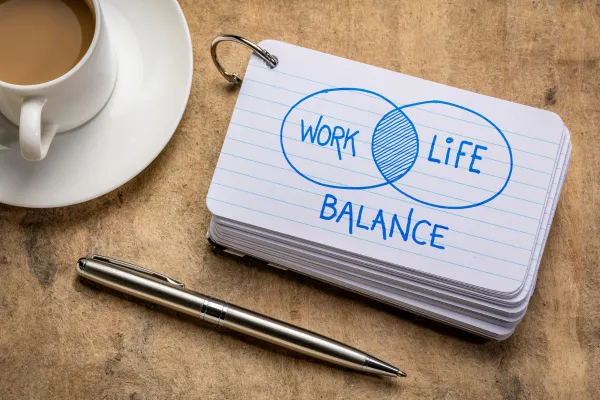Follow Us:
The Block Talk Blog

Balancing Act: The Crucial Importance of Work-Life Balance for Correctional Staff
“Don't get so busy making a living that you forget to make a life.” - Dolly Parton
Introduction:
Working in a correctional facility is not just a job; it's a demanding and often emotionally taxing profession. Correctional staff members are tasked with maintaining order, ensuring safety, and facilitating rehabilitation within a challenging environment. In the midst of these responsibilities, the concept of work-life balance might seem like a distant luxury. However, it is precisely in this demanding field that prioritizing work-life balance becomes not just desirable but essential. In this blog post, we explore why achieving a healthy work-life balance is crucial for the well-being of correctional staff and the effective functioning of correctional institutions.

1. Mitigating Stress and Burnout:
Correctional work is inherently stressful. Staff are exposed to potentially dangerous situations, confront difficult behavioral issues, and often work long hours under high-pressure conditions. Without adequate time for rest, relaxation, and personal pursuits, the cumulative stress can lead to burnout—a state of physical, emotional, and mental exhaustion. Burnout not only compromises the well-being of individual staff members but also diminishes their effectiveness on the job, leading to decreased morale, productivity, and job satisfaction.
2. Promoting Physical and Mental Health:
The demanding nature of correctional work can take a toll on both physical and mental health. Irregular schedules, exposure to trauma, and the constant need to remain vigilant can contribute to sleep disturbances, anxiety, depression, and other health issues. Achieving a balance between work and personal life allows correctional staff to prioritize self-care, engage in healthy activities, and seek support when needed. By investing in their own well-being, staff members are better equipped to cope with job-related stressors and maintain resilience in the face of adversity.
3. Strengthening Relationships:
Long hours and irregular shifts can strain personal relationships, making it challenging for correctional staff to nurture meaningful connections with family and friends. Building and maintaining strong social support networks are essential for emotional well-being and resilience. Spending quality time with loved ones, participating in leisure activities, and pursuing hobbies outside of work provide opportunities for relaxation, rejuvenation, and fulfillment. A healthy work-life balance allows correctional staff to prioritize their relationships, fostering stronger bonds and enhancing overall life satisfaction.
4. Enhancing Job Satisfaction and Retention:
A workplace that values and supports work-life balance is more likely to attract and retain talented staff members. Job satisfaction is closely linked to the ability to achieve a healthy balance between work and personal life. Correctional institutions that prioritize employee well-being demonstrate a commitment to the holistic welfare of their staff, fostering a positive organizational culture characterized by trust, respect, and mutual support. By investing in work-life balance initiatives such as flexible scheduling, telecommuting options, and wellness programs, institutions can cultivate a motivated and dedicated workforce.
5. Improving Performance and Safety:
When correctional staff are well-rested, emotionally resilient, and fulfilled in their personal lives, they are better equipped to perform their duties effectively. A workforce that is physically and mentally healthy is more alert, responsive, and capable of making sound decisions in high-stakes situations. By reducing stress and burnout among staff members, institutions enhance overall safety and security within correctional facilities, creating a conducive environment for both staff and inmates to thrive.
Conclusion:
Achieving a healthy work-life balance is not just a personal luxury; it is a fundamental necessity for the well-being of correctional staff and the effective functioning of correctional institutions. By prioritizing work-life balance initiatives, institutions demonstrate a commitment to the holistic welfare of their staff, fostering a positive organizational culture that promotes resilience, satisfaction, and safety. As we navigate the complexities of the corrections landscape, let us recognize and prioritize the importance of balancing the demands of work with the joys of life outside the workplace.
Follow Us
Follow Us

The Corrections Community Network is an online community created by correctional professionals for correctional professionals. We are dedicated to the health, wellness, personal and professional development of corrections, probation and parole staff everywhere.
Contact Us
john@thecorrectionsdr.com
- Monday - Friday, 8:00 am - 5:00 pm
The Corrections Community Network. All rights reserved.
© Copyright 2026.

